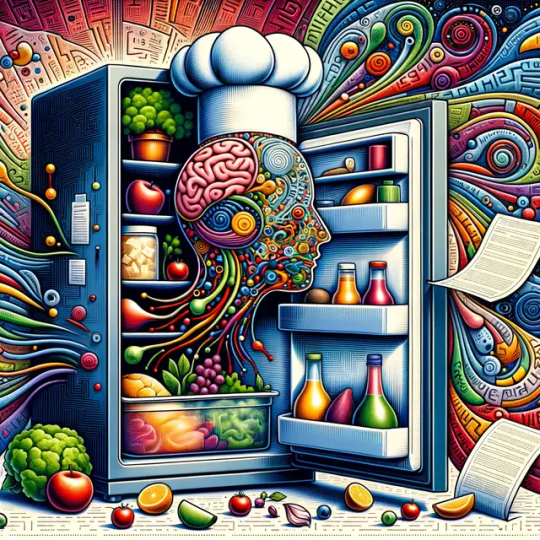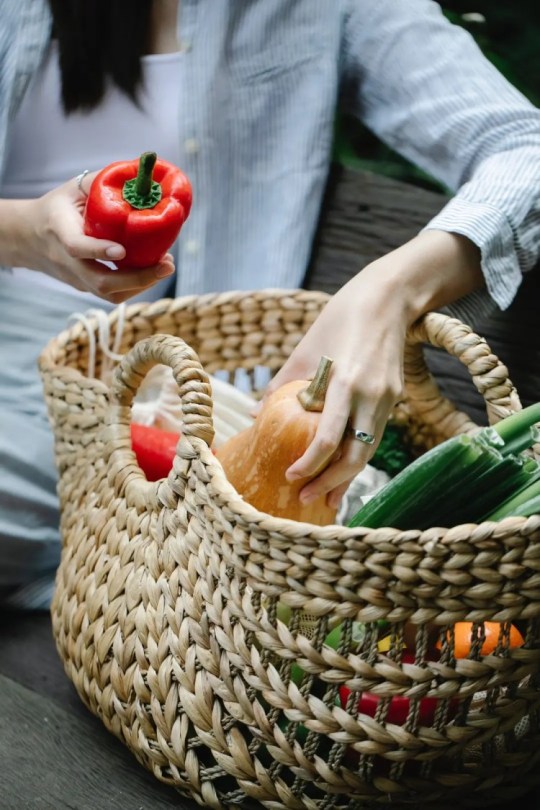#reduce food waste
Explore tagged Tumblr posts
Text

Happy #EarthDay!! 🌎 Reduce food waste in your kitchen by saving your Parmesan rinds to flavor sauces & stocks! 🍝
#spaghetti#tomato sauce#pasta#homemade sauce#italian food#italian cuisine#italian recipes#recipes#happy earth day#earth day#earth month#sustainable cooking#sustainability#zero waste#reduce food waste
21 notes
·
View notes
Text
Little Adulting win!
I was getting ready to do my weekly meal prep, and discovered that I have all my ingredients (or decent substitutes) already at the house!! This means I can save the two hours that it would take to go shopping to either meal prep or accomplish other house chores that have gotten put aside this week.
I've been using a freezer cooking menu planner to prep my dinners for the upcoming week, and this month I added a personal challenge I call Use what you have to use items already in my freezer/pantry/fridge as key ingredients in the menu to try and reduce my food waste from freezer burn or going stale.
Pic of one of my meals from last month, Smoked Sausage and Lentil Soup.

#use what you have#home cooking#meal prep#meal planning#cooking for one#freezer cooking#reduce food waste#one day at a time#cleaning#clutter#unfuck your habitat#building new habits takes time#ufyh#undiagnosed neurodivergent#operation functional home
5 notes
·
View notes
Text
Harnessing AI for Culinary Convenience: Discover Recipes from Your Food Inventory Welcome to the exciting world of Fridge-To-Table, where artificial intelligence meets everyday cooking! This innovative solution leverages advanced visual recognition technology to assess what ingredients you have on hand, whether they're peeking out from your fridge, stacked high in your pantry, or even listed on your receipts. Imagine turning the uncertainty of meal planning into a streamlined, stress-free experience. How It Works By simply capturing images of your food, Fridge-To-Table intelligently identifies the items and catalogues them. The AI goes beyond mere recognition; it considers expiry dates, nutritional content, and even potential flavor pairings. With this detailed inventory at your fingertips, Fridge-To-Table then curates a selection of delectable recipes tailored to your current stock. Your Culinary Companion Forget about last-minute grocery runs and wasted ingredients. With our AI-powered assistant, cooking becomes a creative outlet instead of a chore. Receive recipe suggestions that minimize waste and maximize flavor, all while expanding your culinary repertoire. Whether it's a quick weeknight dinner or a complex weekend feast, every dish becomes a possibility with Fridge-To-Table. Community Perks and Future Directions We're not just building technology; we're fostering a community of food lovers. Enhanced sharing features allow users to contribute their own recipes and cooking tips, creating a rich resource for everyone. We aim to introduce collaborative features that will allow friends and family to create meal plans together, no matter the distance. This AI-driven technology is more than just a tool—it’s a culinary companion that adapts to your lifestyle. Join Us on This Journey We invite you to explore Fridge-To-Table and unlock a new chapter in cooking that blends convenience with creativity. Utilize AI to inspire your meals, reduce food waste, and discover the joy of cooking with what you’ve got. The fridge may hold a world of possibilities—let’s uncover them together!

0 notes
Text
Life hack: if you have too much pasta sauce, you might be able to use the rest for a pie filling!
Not enough leftover pasta sauce for your pie? Add potatoes!
0 notes
Text

Another batch turning leftover bagels into bagel chips, following this recipe here.
0 notes
Text
What is sustainability in diet?
Understanding the Concept of Sustainability in Diet Sustainable Diet: What It Is and Why It Matters for Our Future Introduction In today’s world, the concept of sustainability extends far beyond environmental conservation; it also encompasses the food we eat. A sustainable diet is not just a trend but a crucial part of ensuring the health of our planet and future generations. In this post, we’ll…
#biodiversity#climate change#diet tips#eco-friendly diet#environmental impact#fair trade#food security#green living#health benefits#healthy eating#local produce#low carbon diet#Plant-Based Diet#reduce food waste#seasonal eating#sustainability#sustainable agriculture#sustainable diet#sustainable eating.#sustainable food sources
0 notes
Text
Importance of Food Preservatives: Ensuring Quality and Safety

Food preservatives, including antimicrobial agents like sodium benzoate and potassium sorbate, natural preservatives such as sorbic acid, and chemical preservatives like butylated hydroxytoluene (BHT), are essential additives added to food to inhibit the growth of bacteria and fungi, thereby enhancing food safety and extending shelf life. These food preservatives prevent the growth of microorganisms, reducing the risk of food poisoning and ensuring the safety of food products. By maintaining physical and chemical stability, preservatives also contribute to reducing food waste and enabling the widespread availability of preserved foods throughout the year. By maintaining the quality and freshness of food items these preservatives can directly reduce food waste. This reduction occurs because preservatives help to uphold the physical and chemical stability of food, thereby minimizing spoilage and ensuring that consumers can access preserved foods consistently throughout the year.By effectively inhibiting bacterial growth and preventing foods from spoiling prematurely, these preservatives ensure that the food supply remains safe, reliable, and accessible, contributing to a more sustainable food system overall.
To read more please visit:
Reachemical chemicals
reachemchemicals@gmail.com
16479857177
600 Matheson Blvd W Unit 5, Mississauga, Ontario ,ON L5R 4C1.
#reduce food waste#food products#added to food#bacteria and fungi#butylated hydroxytoluene#growth of bacteria#bacterial growth#prevent foods#food safety#sodium benzoate#antimicrobial preservatives#inhibit the growth#shelf life#natural preservatives#sorbic acid#chemical preservation#physical and chemical#prevents the growth of microorganisms#food preservatives#food poisoning
0 notes
Text
Four Points by Sheraton Phuket Patong Beach Resort drives sustainability forward with installation of EV charging stations
Phuket, Thailand, June 6, 2024 – Four Points by Sheraton Phuket Patong Beach Resort, the award-winning resort nestled just steps from the Andaman Sea Continue reading Four Points by Sheraton Phuket Patong Beach Resort drives sustainability forward with installation of EV charging stations

View On WordPress
#EV charging stations#Four Points by Sheraton Phuket Patong Beach Resort#lamb from Bang Jo#recycles#reduce food waste#Scholars of Sustenance (SOS) Foundation
0 notes
Text

How to pack food for a road trip - Best Mama Kitchen
0 notes
Text
How to Save Money on Groceries: 7 Simple Tips
person shopping for groceries on a budget Saving money on groceries is one of the best ways to save money overall. Here are 7 simple tips: Plan your meals ahead of time. This will help you avoid impulse purchases and ensure that you have everything you need on hand. Make a shopping list and stick to it. This will help you avoid overspending. Shop at discount grocery stores. Discount grocery…

View On WordPress
0 notes
Photo

(via 15 Creative Recipes Using Vegetable Scraps)
Have you ever peered into your kitchen bin and wondered about the untapped potential of those vegetable scraps you toss in there? What if we told you that your kitchen scraps can be transformed into mouthwatering dishes that will have you craving for more? It’s time to turn those “waste” bits into stars of your culinary show! Let’s embark on a delicious adventure and explore 15 scrumptious recipes that will not only satisfy your taste buds but also make a dent in food waste.
0 notes
Link
#foodexpirationdates#foodsafety#reduce food waste#stopfoodwasteday#smartconsumption#sustainableeating#FoodWasteAwareness#food sustainability#nomorefoodwaste
0 notes
Text
Spuds Spuds Wonderful Spuds!
We’ve all done it, discovered a forgotten about potato or three in the back of the cupboard. Don’t throw any future finds out though, if they’ve started producing shoots, you can plant them! With time & care they should produce more potatoes for you! Not enough room for a vegetable patch? Well, you don’t need much – you can do this on a balcony as well as in a garden – watch the video to find…

View On WordPress
#a company with a conscience#activities for children#cost of living#garden hacks#gardening#get your hands dirty#grow your own#growing plants#health#horticultural therapy#horticulture#keep kids entertained#mental health benefits#money saving tips for gardeners#new hobby#Nourish Flourish UK#nutrition#physical health benefits#reduce food waste#reuse and recycle#save money on food#sowing seeds#try this at home#vegan
0 notes
Text
Be Mindful and Reduce Food Waste
Food, is the basic necessity of life, the substance we consume to provide nutritional support to our body, and which helps in growth and other functions of our body. Our food provides us with the much-needed nutrition and energy that we need to grow, focus, and function in different activities. Eating food is not only satisfying for the human body but it is also giving pleasure to our senses of…

View On WordPress
#watch our food and create less waste#buy local#compost#create less waste#food waste#less waste#Reduce Food Waste#Watch your Food
0 notes
Video
tumblr
Food waste management is a crucial aspect of sustainability that has gained increasing attention in recent years. The United Nations Food and Agriculture Organization (FAO) estimates that approximately one-third of all food produced for human consumption is lost or wasted globally. This equates to around 1.3 billion tonnes of food per year, which has significant economic, social, and environmental implications. In this article, we will explore the importance of food waste management and discuss some effective strategies for reducing food waste in the hospitality industry.
The hospitality industry, which includes hotels, restaurants, and catering services, is one of the largest contributors to food waste. The reasons for this are varied and complex, but include overproduction, spoilage, improper storage, and excessive portion sizes. Food waste not only represents a significant cost to businesses but also has negative environmental impacts. When food waste is sent to landfills, it produces methane, a potent greenhouse gas that contributes to climate change.
To reduce food waste, hospitality businesses can implement a range of strategies that target different stages of the food supply chain. One effective approach is to adopt a "root-to-stem" or "nose-to-tail" philosophy, which involves using as much of the food as possible, including parts that are often discarded, such as stalks, stems, and offal. This not only reduces waste but can also lead to cost savings and the creation of new menu items that appeal to environmentally-conscious consumers.
Another strategy is to implement better inventory management practices. By tracking food supplies more closely and ordering only what is needed, businesses can reduce the risk of overproduction and spoilage. Proper storage and handling of food can also help to extend its shelf life and reduce waste.
A new food packaging solution has been developed by OxySorb (Sorbead India) which sachet provides a safe solution for food preservation. Sorbead India claims that the new technology can extend the shelf life of products by up to three times longer than existing packaging solutions. This new technology could have a significant impact on the food industry, potentially reducing food waste and increasing profits. This can involve investing in better refrigeration equipment, implementing food rotation systems, and training staff in proper food handling techniques.
Portion control is another important strategy for reducing food waste. Many restaurants and hotels serve portions that are larger than necessary, leading to uneaten food being discarded. By offering smaller portion sizes and encouraging customers to take leftovers home, businesses can reduce waste and improve their bottom line.
Finally, businesses can work to divert food waste from landfills through composting and food donation programs. Composting involves converting food waste into nutrient-rich soil that can be used in gardens and farms. Food donation programs can help to provide food to those in need, while also reducing waste.
In conclusion, food waste management is a critical issue for the hospitality industry. By implementing effective strategies such as root-to-stem cooking, inventory management, portion control, and food diversion programs, businesses can reduce waste, save money, and improve their environmental impact. It is essential that businesses take action to address this issue and work towards a more sustainable future for the food industry.
1 note
·
View note
Text
Food Saving App

If you're looking to reduce food waste and save money on food, look no further than Takkul, the must-have food-saving app in UAE. Takkul is an innovative platform that enables food retailers (restaurants, bakeries and grocery stores) to offer their surplus food to customers at reduced prices. With Takkul, you can find amazing deals on food.
0 notes